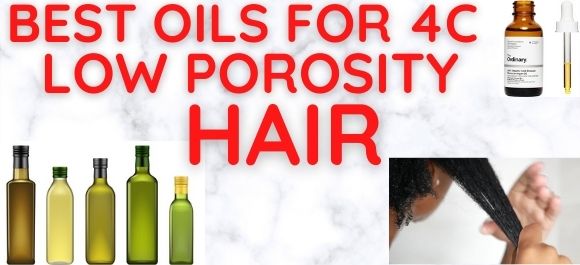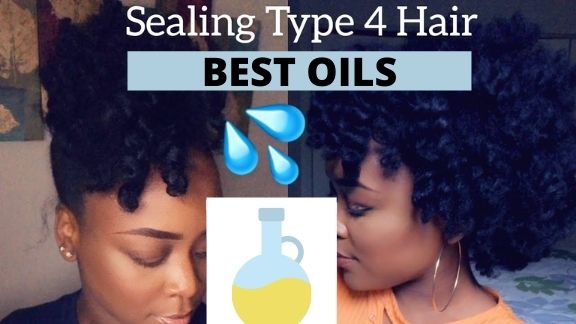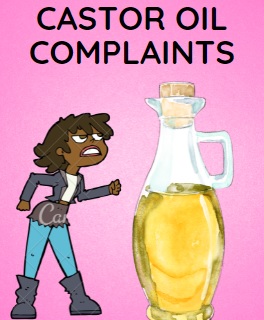Best Oils for 4C Low Porosity Hair [Moisture & Sealant Guide]
- NHP
- Type 4C Hair 101
- Hair Porosity
- Best Oils for 4C Low Porosity Hair
You looking for the best oils for 4C low porosity hair? GOOD! Find them right here and right now.
If you have low porosity hair, then you know how important oils are. Since low porosity hair loves oils, it’s important to give it the best oils possible – but that’s easier said than done. With so many opinions online as to which oils are best, it can be difficult to choose just one to use.
Not to mention, oils have so many functions that there is a chance you could be using a certain oil incorrectly for your specific porosity of hair.
So how do you know which oils to use? How do you know what is best for your 4C hair? And how do you know if an oil is moisturizing or sealing? And what even is the difference between moisturizing oils and sealing oils?
In this article about the best oils for 4C low porosity hair, we’ll cover those topics and more to help make choosing oils easier for you.
 Best oils for 4C low porosity hair GUIDE!
Best oils for 4C low porosity hair GUIDE!What is 4C Low Porosity Hair?
Before we get into the best oils for 4C low porosity hair and discussing which are the premium moisturizing and sealing oils for you, it’s important to make sure that you do have 4C low porosity hair.
Knowing whether or not your hair is low porosity will help you make informed decisions on what products you need. If you’re unsure after reading this article, I recommend trying the porosity float test or water test.
If you have low porosity hair, that means that your hair loves to take in oil but is resistant to water. The plus side is that your hair is strong enough to resist friction, but the downside is that there’s a high chance you’ll suffer from dandruff, dry scalp, and that your hair dries slowly.
If that’s you, then you need to invest in using more moisturizing oils than sealing oils.
Now, if you have high porosity hair, that means that your hair loves to take in water but is resistant to oil. Now, you won’t suffer from dry scalp, but you may have issues with maintaining definition and body.
If that sounds like you, you may need to invest in more sealing oils and protein treatments rather than moisturizing oils, you might want to check out my article titled: "does low porosity hair need protein?".
However, just because your hair may prefer one type of oil to another doesn’t mean that you stop using that type of oil – by no means!
There are so many benefits to using both oils that it’s important to make sure that you try to incorporate both. However, one may have more benefits for you and your hair needs than another oil. We’ll be listing below a few oils that may work for you.
Moisturizing Oils for Low Porosity Hair That Penetrate
Due to the secure and lipophilic nature of low porosity hair, you may find it difficult to keep your hair from drying out. You may try steam baths, spray bottles, and other resources, but those water droplets will just bead on top of your strands.
That’s why it’s so important to find moisturizing oils to help you keep your hair moisturized, oils that will be perfectly suited for DIYing a hot oil treatment for low porosity hair in your home.
So how do you know an oil is moisturizing? A moisturizing oil usually has a high fatty acid content and can easily penetrate the cuticle. These types of oils are excellent for treating dandruff, promoting growth, and nourishing your hair strands.
You can also use these types of oils as a pre-shampoo treatment, deep conditioner, or even for a scalp massage to stimulate growth. If you’re having a hard time figuring out what types of oils could count as moisturizing oil, here is a shortlist of a few oils that qualify:
- Hydrolyzed wheat protein oil
- Avocado oil
- Baobab oil
- Coconut oil
- Olive oil
- Sunflower oil
Out of all the best oils for 4C low porosity hair, #1 might be hydrolyzed wheat protein oil.
It's one of the best proteins for low porosity hair because hydrolyzed wheat protein oil has a small enough molecule structure too enter low porosity hair strands which is benefecial, but big enough molecule size to cover and protect your hair strands.
Sealing Oils for Low Porosity Hair
 Best oils for 4C low porosity hair sealing!
Best oils for 4C low porosity hair sealing!Now, moisture isn’t the only thing that keeps low porosity hair happy and functioning.
We need to make sure that you have a wealth of sealing oils at your disposal too. If you enjoy styling your hair, straightening it, or want to stop split ends, it’s vital to look for a sealing oil that works best for you and your hair.
So how do you know if an oil is for sealing? A sealing oil is usually low in fatty acid content and doesn’t penetrate the cuticle as well. In fact, it usually sits atop your hair, gently coating it and adding shine. But it’s not a passive oil by any means.
Sealing oils keep moisture and water inside the cuticle and can prevent other elements from getting out.
And because of the slippery content of sealing oil, it’s great for naturals who like to try different styles as it will reduce split ends and stop breakage. If you’re not sure what qualifies as a sealing oil try these out:
- Argan oil
- Grapeseed oil
- Jojoba oil
- Sweet almond oil
You can use sealing oils for your everyday looks to prevent friction, but most people incorporate sealing oils in their LOC method, oil rise, and detangling routine.
What If I Don’t Like These Oils for Moisturizing And Sealing Low Porosity Hair?
Now, if you’ve found that you can’t use any of the oils we suggested due to things like allergies, not having access to them, or just don’t like the smell, don’t worry.
There is a simple trick that you can use to find out if an oil you do like is sealing or moisturizing. When you look at the back of the bottle’s label, observe the “total fats” section.
Within that section, you’ll see three types of fats listed: polyunsaturated fats, saturated fats, and monosaturated fats. These fats will tell you whether or not an oil is good for sealing or for moisturizing.
- If polyunsaturated fats number of grams is higher than the saturated and/or monosaturated, then it’s a sealing oil
- If polyunsaturated fats number of grams is lower than the saturated and/or monosaturated fats, then it’s a moisturizing oil
With this tip in mind, you can look at any plant-based oil in the world. As long as it’s digestible, it’s safe for your hair.
Some Complaints About Castor Oil For Low Porosity Hair

My goal is to always keep it real with you, even about products that are sometimes called the best oils for 4C low porosity hair, but may not be for you.
So, while many women love Castor oil (A.K.A. Ricinus oil) and we all know it’s been praised for its beauty and hair growth benefits. It’s not perfect, and some women don’t like it.
So I’ll tell you the other side of the story….
Many people boast that castor oil for low porosity hair helps them in thickening their hair and combating thinning hair, and it does in many cases!
Castor oil for low porosity hair has both antibacterial and antifungal properties and is a humectant for dry 4C hair and dry skin. Many prefer the cold pressed castor oil for sealing 4C low porosity hair and get great results, but here’s why some have stopped applying castor oil for low porosity hair.
For one, castor oil is a thicker and heavy oil for some hair types. It can weigh some hair types down and block out moisture. This happens to some hair type even when used in small amounts or mixed with a lighter oil.
So even though castor oil is one of the best oils for 4C low porosity hair in the opinion of many women, those with very thin 4C hair may notice constant buildup on their scalp. Build-up in the hair is rarely ever a good thing.
As castor oil dries it tends to form a hard film. This is probably great for high porosity hair, but could be a recipe for disaster for thin low porosity hair that can’t hold up under a heavy film.
On top of that, the film is not water-soluble, which means you’ll definitely need to use a great shampoo to remove it. If castor oil sits on top of your low porosity 4C hair it can also attract dirt and oil, creating an even thicker layer of film around your strands and on your scalp.
Hot Oil Treatment For Low Porosity Hair [Video]
If you’re looking for some good methods for doing a hot oil treatment for low porosity hair, you should check out this video by 4C natural Tshidi Radebe using some of the best oils for 4C low porosity hair, she also has some great vids for detangling 4C hair and other great kinky hair care tips.
Conclusion: Best Oils For 4C Low Porosity Hair
With these tips and tricks in mind, you can utilize these oils to improve your hair in any way you need to.
Anything from creating your own DIY deep conditioner for low porosity, all the way to just shopping a little smarter, there are so many oils out there just waiting for you to use them.
What are some oils that work well with your hair? And did you know about moisturizing and sealing oils before? What are the best oils for 4C low porosity hair that you've experienced? Email NHP at questions [at] naturalhair-products.com and let us know!


